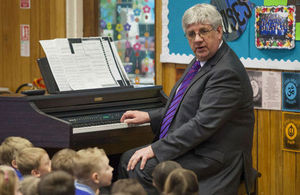Schools get £4 million boost from copyright deals
New copyright agreements will free schools from time-consuming paperwork, allowing them to focus on teaching.

Schools and local authorities across England will collectively save around £4 million after a copyright deal was struck for rights to the use of music in schools, the government confirmed today (27 March 2015).
Previously licences for the use of music had to be bought individually by schools and local authorities, often involving expensive and time-consuming negotiations. Now the government has agreed a deal to hold the copyright licences centrally, freeing schools from the burden of applying for them independently.
The government is determined to help teachers cut unnecessary workload and bureaucracy so they can focus on what they do best - teaching. Last month, Education Secretary Nicky Morgan and Deputy Prime Minister Nick Clegg pledged to support the profession, in response to the Workload Challenge, by announcing a series of actions, including:
- giving schools more notice of significant changes to the curriculum, exams and accountability, and not making changes to qualifications in the academic year or during a course, unless there are urgent reasons for doing so
- a commitment by Ofsted not to change its handbook or framework during the school year, except when absolutely necessary, and to keep updating its new myths and facts document stating what inspectors do and do not expect to see
The copyright licences will cover a wide variety of uses of music, including the recording of pupils’ performances on CD and DVD, school discos, radios in the staffroom and even holding music for telephones.
The latest deals follow previous agreements over the past 2 years on rights to use films, TV shows and newspapers in schools. The total potential savings for schools and councils as a result of dealing with copyright centrally will be up to £16.5 million per year.
Schools Minister David Laws said:
Day in, day out, teachers across the country are working phenomenally hard to help children reach their full potential.
We want to do all we can to support them to reduce the burden of unnecessary tasks so they can channel their resources into what is most important - educating young people.
The simplifying of copyright licensing in schools is another example of this, giving schools across the country the freedom to work on raising attainment levels further while saving millions of pounds.
Jo Warner-Howard, Director of Education at the Copyright Licensing Agency, said:
Building on the success of the first centralised copyright licensing model, this new plan, which extends over a longer period and includes more copyright licences, is testament to what can be achieved through the collaboration of the copyright industry and the Department for Education.
The bottom line is that by simplifying copyright licensing in schools, the substantial administrative savings will directly benefit schools whilst rewarding the crucial role of creative content in school life.
The new deals - which will come into effect from next month - have been struck with the Performing Right Society (PRS), Phonographic Performance Limited (PPL), Mechanical Copyright Protection Society (MCPS) and CCLI.
Meanwhile, the Copyright Licensing Agency licence, the Schools Printed Music licence and the Newspaper Licensing Agency licence have been extended for a further 5 years.
The announcement today builds on the action already taken by the government since 2010 to support teachers by reducing administrative burdens and workload, including:
- making it easier for schools to extend the length of the school day, allowing more time for supervised study and extra-curricular activities, to the benefit of disadvantaged pupils in particular
- cutting more than 21,000 pages of guidance, streamlining the inspection process and making it clear that formal written plans are not expected for every lesson
- reducing paperwork for schools and businesses when arranging work experience placements, giving young people greater opportunities to make informed decisions about their future
Notes to editors
- The licences apply to all state schools, including local-authority-maintained schools, academies, and other types of schools such as pupil referral units (PRUs) and special schools.
- The total savings of moving to paying for the licenses centrally is estimated by the Department for Education to be up to £16.5 million in the 2015 to 2016 financial year. These savings are made up of the discounts negotiated on the cost of the licenses themselves and the savings in administrative costs of local authorities and schools, who previously negotiated deals themselves.
- The central licences that have been in existence since April 2013 are: the Copyright Licensing Agency licence, which gives schools the right to photocopy books, magazines and journals, make digital copies by scanning or re-typing for distribution to pupils, parents, teachers or governors, and make copies of content from digital material including CD ROMs, electronic workbooks, online journals and included websites; and the School Printed Music licence, which covers the copying of a school’s sheet music for curricular and extra-curricular school activities, making arrangements of musical works and distributing licensed copies to school members.
- The Hargreaves Review was an independent review commissioned by the Prime Minister in November 2010 to look at how the intellectual property framework supports growth and innovation. Chaired by Professor Ian Hargreaves and assisted by a panel of experts, the review reported to government in May 2011 making recommendations for government. This included a recommendation to simplify the licensing process for copyright users in the digital age, which is now government policy. Further details about the review can be found on the Independent Review of Intellectual Property and Growth’s website.
DfE media enquiries
Central newsdesk - for journalists 020 7783 8300